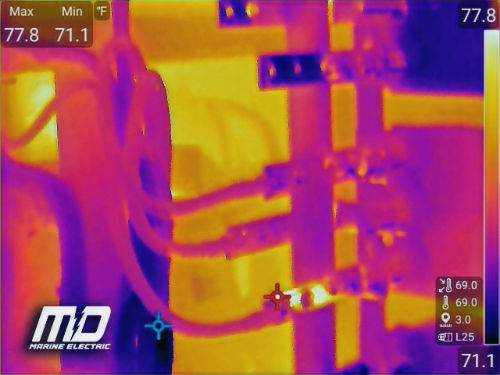The Alarming Rise of Electrical Fires on Ships and Essential Safety Tips to Stay Afloat
- Ryan Patrick Murray
- Nov 5, 2025
- 4 min read
Electrical Fire Risks on Industrial Vessels
Electrical fires on vessels have become a growing concern, with incidents increasing significantly in recent years. While many focus on the operational efficiency and robustness of large industrial vessels, it's vital to recognize the hidden threats within these massive structures. A single electrical spark can swiftly transform a routine operation into a frightening emergency. By understanding the risks associated with electrical systems and applying effective safety measures, operators can better protect their crew and assets.
Understanding the Risks
Overloaded Circuits: Excessive demand on electrical systems can lead to overheating and potential fires.
Faulty Wiring: Deteriorated or improperly installed wiring increases the risk of short circuits.
Equipment Malfunctions: Defective electrical devices can ignite fires if not regularly maintained.
Environmental Factors: Exposure to moisture and corrosive elements can compromise electrical systems.
Effective Safety Measures
Regular Inspections: Conduct routine checks of electrical systems to identify and rectify potential hazards.
Proper Training: Ensure that crew members are trained in electrical safety and emergency response procedures.
Use of Quality Equipment: Invest in high-quality, marine-grade electrical components to minimize risks.
Emergency Protocols: Develop and practice emergency response plans for electrical fires.
By implementing these safety measures, operators of large industrial vessels can significantly reduce the risk of electrical fires and enhance the overall safety of their operations.
In this post, we’ll uncover the harsh reality of electrical fires on ships, investigate their frequent causes, and share vital safety tips to ensure you remain secure while enjoying your boating adventures.

Understanding the Risks
Electrical systems on ships are intricate and can fail if not properly maintained. The combination of tight spaces and flammable materials makes boats particularly susceptible to electrical fires. According to the National Fire Protection Association (NFPA), electrical failures are responsible for about 25% of boat fires each year. In 2021 alone, there were approximately 1,000 reported incidents, leading to significant property damage and numerous injuries.
A small electrical spark can ignite materials like upholstery or fuel, allowing fire to spread rapidly. These facts highlight that awareness and prevention are crucial in combating electrical fires on your vessel.
Common Causes of Electrical Fires
Several factors contribute to the alarming rise in electrical fires on ships. Understanding these causes is key to prevention:
Faulty Wiring: Wiring can become frayed, corroded, or damaged over time. For instance, a frayed wire can lead to short circuits that may spark a fire. According to a safety study, nearly 60% of electrical fires resulted from faulty wiring.
Overloaded Circuits: Many maritime professionals underestimate their electrical systems' power demands. Overloaded circuits can cause overheating. For instance, using three high-wattage appliances simultaneously on a single circuit can double the risk of overheating. Always check your circuit ratings and use separate circuits for high-demand devices.
Improper Installation: While DIY projects can save money, they can also lead to costly mistakes. Poor installation of electrical components was a contributing factor in around 30% of electrical fire incidents. Always consider hiring a qualified marine electrician to ensure compliance and safety.
Poor Maintenance: Neglecting maintenance can lead to electric failures. Regular checks of batteries, connections, and devices are essential to catch potential issues early. Boaters should schedule a comprehensive electrical system inspection at least once a year.
Essential Safety Tips to Prevent Electrical Fires
Now that we understand the risks and common causes, let’s break down practical safety tips to keep you safe while boating.
1. Conduct Regular Inspections
Regular inspections are vital. Look for frayed wires, loose connections, or corrosion. Ensure to check your entire electrical system quarterly, addressing any issues immediately to prevent escalation.
2. Invest in Quality Equipment
Investing in quality components can minimize the risk of failure. Using marine-grade wiring and circuit breakers can extend the lifespan of your systems. For example, properly rated marine-grade components can withstand harsh marine conditions, reducing breakdown chances by up to 50%.
3. Avoid Overloading Circuits
Be cautious with the power used on your boat. Avoid running multiple high-wattage devices at the same time. If necessary, consider having additional circuits installed to better distribute power loads safely.
4. Hire Professionals for Installations
Electrical work is best left to professionals. A skilled marine electrician will guarantee that your electrical systems are installed correctly and comply with regulations, protecting you from future problems.
5. Keep Fire Extinguishers Accessible
Every vessel must have easily accessible fire extinguishers. Familiarize yourself with their locations and keep the extinguishers serviced, replacing them at least every five years.
6. Educate Your Crew
Ensure everyone on board knows the dangers associated with electrical fires and how to respond in emergencies. Hold regular safety drills so that everyone is prepared to act swiftly if necessary.
7. Install Smoke Detectors
Smoke detectors are just as important on boats as in homes. Install marine-grade smoke detectors and test them monthly to ensure they are in working order.
8. Create an Emergency Plan
Develop a clear emergency plan in case of fire. Ensure that all crew members are familiar with the plan and their responsibilities. Practice the procedure regularly to promote readiness.
Final Thoughts
The rise of electrical fires in the maritime industry is an issue everyone must take seriously. By understanding potential risks and recognizing common causes, you can reduce your risk significantly. Implementing the safety tips discussed here is not just advisable but essential for a safe and enjoyable boating experience.
Stay alert, conduct regular inspections, and invest in quality equipment to protect yourself, your crew, and your boat. Enjoy your time on the water while prioritizing safety, and happy boating!


